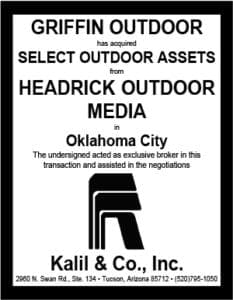
During the last week, Billboard Insider published a couple articles on related Constitutional clauses. First, Insider reminded us in What the Senate Said About Amortization while cautioning that the regulatory concept had actually been enacted into an ordinance by Wenatchee, Washington last year. Wenatchee and other governmental entities utilize the amortization technique-the compulsory elimination of nonconforming properties such as billboards within a predetermined period of time and without monetary compensation-as a valid exercise of their police power. Those jurisdictions that tolerate amortization do so when the period is “reasonable,” and the ordinance bears a fair relationship to the legitimate governmental objective sought to be obtained, thereby avoiding violation of the Taking Clause of the Fifth Amendment: “nor shall private property be taken for public use, without just compensation.”
On the other hand, most of the courts across the country have rejected amortization as unconstitutional in cases during the last three decades. For example, the Missouri Supreme Court explained in 1965 in Hoffman vs Kinealy:
It would be a strange and novel doctrine indeed which would approve a municipality taking private property for public use without compensation if the property was not too valuable and the taking was not too soon, and prompts us to repeat the caveat of Mr. Justice Holmes…that ‘[we] ae in danger of forgetting that a strong public desire to improve the public condition is not enough to warrant achieving the desire by a shorter cut than the constitutional way of paying for the change.’
Likewise, the Pennsylvania Supreme Court explained in 1991 in Pennsylvania Northwestern Distributors vs Zoning Hearing Board:
It is clear that if we were to permit the amortization of nonconforming uses in this Commonwealth, any use could be amortized out of existence without just compensation…Even a homeowner could find one day that his or her ‘castle’ had become a nonconforming use and would be required to vacate the premises within some arbitrary period of time, without compensation.
The Federal Highway Beautification Act codifies this judicial repudiation of amortization under 23 USC Section 131 (g):
Just compensation shall be paid upon the removal of any outdoor advertising signs, display or device lawfully erected under State law…whether or not removed pursuant to or because of this section.
Most State HBA “mirror laws” have incorporated this just compensation provision from the Federal Act. As such, billboards adjacent to federal interstate and primary highways are generally protected against the uncompensated removal by governmental action, including though amortization.
Which brings us to the other article published by Insider this past week: Kentucky House Approves Billboard Legislation. Kentucky is joining Texas, Oregon, and Tennessee in amending their HBA mirror laws to cure First Amendment Free Speech violations. The action of the Kentucky Legislature follows the recent decision by the Sixth Circuit Court of Appeals in LD Management vs Kentucky, holding that the on-premise/off-premise distinction in the Kentucky HBA was content-based and unconstitutional, and relying on the Supreme Court’s seminal 2015 decision in Reed vs Gilbert.
Municipal sign codes across the country have also been constitutionally invalidated for similar content-based deficiencies, including that of the City of Austin in the case brought by Reagan and Lamar. Austin recently petitioned the Supreme Court for review, and several states facing First Amendment legal challenges to their HBAs may do so as well.
Such legal challenges to State HBAs place the billboard industry in a rather awkward position. On the one hand, the industry champions the First Amendment, and heartily welcomes judicial decisions and legislative amendments insuring that State HBAs contain constitutional content-neutral regulations. On the other, however, the same State HBAs have been the critical bulwark preserving Fifth Amendment rights and preventing the unconstitutional taking of billboards through amortization. Therefore, as an increasing number of State Legislatures consider amendments to their State HBAs, let’s hope these leaders don’t damage one Constitutional clause while trying to cure another one.
[wpforms id=”9787″]
Paid Advertisement

















